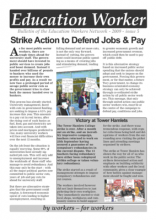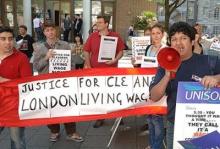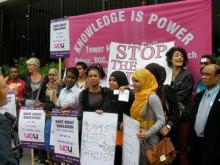Education Worker #5
The new Education Worker, bulletin of the EWN is now available. You can download it from the link below.
In this issue:
- Strike Action to Defend Jobs & Pay
- Victory at Tower Hamlets
- “Five HE Unions, One Demand”?
- PGCE cuts
- London Met Occupied
- Education Without Borders
- Redundancies in HE
- Consultation? What Consultation?
Get your copy by writing to us, or from our stall at the anarchist bookfair on 24. October, or download it as a pdf file here.





